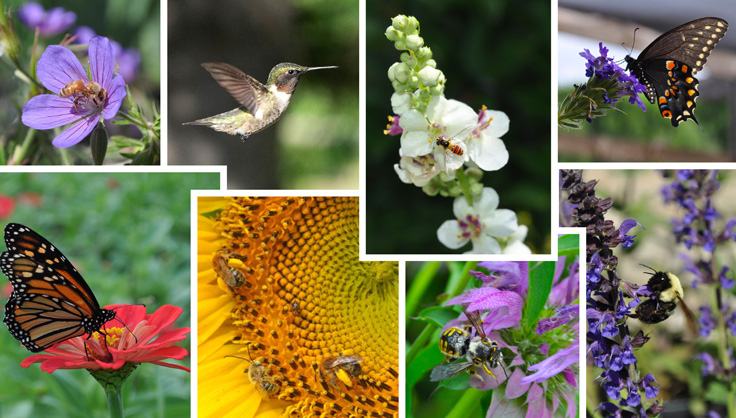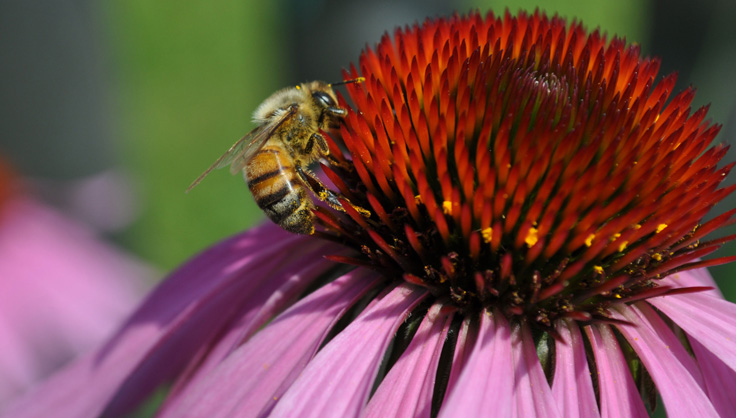Pollinator Protection

It's impossible to overestimate the importance of pollinators — to plants, animals, people, ecosystems — to the survival of the planet as we know it.
Many pollinators are small insects, easily overlooked in our day-to-day lives. However, were they to disappear, we'd surely notice then. We'd say goodbye to apples, blueberries, cucumbers, kiwis, squash, and many more of our favorite foods, as well as the meats we get from livestock that eat forage crops, such as alfalfa, that depend on pollinators. Pollinators bring us an estimated 1 out of every 3 bites of our food!
What is Pollination?
There are about 300,000 species of flowering plants worldwide. About 90% of them depend on pollinators to transfer pollen among flowers, a critical step in the process of fertilization, and the subsequent development of the fruits and seeds necessary for reproduction. Pollinators also help ensure a plant species' genetic diversity, increasing the likelihood that some plants will be able to withstand extreme weather and other challenges, as well as to adapt to changes in climate.
Pollinators in Peril
Most of us recognize honey bees as important pollinators, and the plight of beekeepers battling mites and diseases in their hives has been widely publicized. But did you know that there are 25,000 known species of wild bees, many of which are are also critical pollinators? Now add in the many thousands of species of butterflies, moths, flies, wasps, and and other invertebrate pollinators and the scale of their collective work inspires awe. Even some bats, birds, monkeys, and lizards pollinate specific plants!
What many of us don't know is that more than 40% of invertebrate pollinator species — particularly bees and butterflies — are facing extinction, according to the Food and Agriculture Organization of the United Nations*. Forty percent!
How Gardeners Can Help
Acting alone, a gardener using pollinator-friendly plants and practices can create a safe haven. Imagine if the estimated 95 million households nationwide that do some type of gardening followed suit. Collectively, we can create huge swaths of healthy habitat for pollinators of all stripes!
Gardener's Supply advocates for pollinators with tips like these:
- Less mowing and more growing. Replacing your lawn with flowers and food crops is good for the health of pollinators, your family, and your community.
- Still want some lawn? Go eco. Skip the weed-killers and pesticides that poison not only pollinators, but also harm soil life as well as pets and people! Avoid soluble synthetic fertilizers that can run off into lakes and streams. Learn how to get a lush green lawn naturally.

- Go native. Plants that are native to your region are naturally matched to your pollinator populations. Find the best plants in Pollinator.org's Ecoregional Planting Guides.
- Meet your (insect) neighbors. That caterpillar eating your parsley? It's probably the larva of the beautiful black swallowtail butterfly. Learn to recognize hoverflies, solitary bees, and other pollinators, in all their life stages (eggs, larvae, pupae, adult).
- Manage pests wisely. Use barriers and row covers (garden fabric) to exclude pests. If you must spray to manage a pest infestation, use least-toxic solutions and spray early in the morning or in the evening, when bees aren't active.
- Support growers committed to eco-friendly practices. Look for organically grown seedlings and plants. If your local garden center or big box store doesn't carry them, ask them to do so.
- Say no to "neonics." Look for plants labeled as grown without neonicotinoids — systemic pesticides that spread internally throughout plants, potentially rendering even the pollen and nectar they later produce toxic to pollinators. Many pest control products sold for use in home gardens contain neonicotinoids — don't use them!
- Support your local farmers and beekeepers. Buying fresh organic produce and honey locally helps keep those producers in business and pollinators thriving. If a small farm isn't certified organic, ask them about their pest management strategies — they may be growing organically, but not certified.
- Get involved! Passionate about pollinators? Your town may have a conservation commission or other organization with a mission to protect natural resources. Join in. Or start your own group!
- Become a backyard beekeeper. It's a fun hobby with sweet rewards!
Last updated: 01/05/2023
Print this Article:
Get the Dirt
Stay up to date on new articles and advice. Please fill out the information below.
